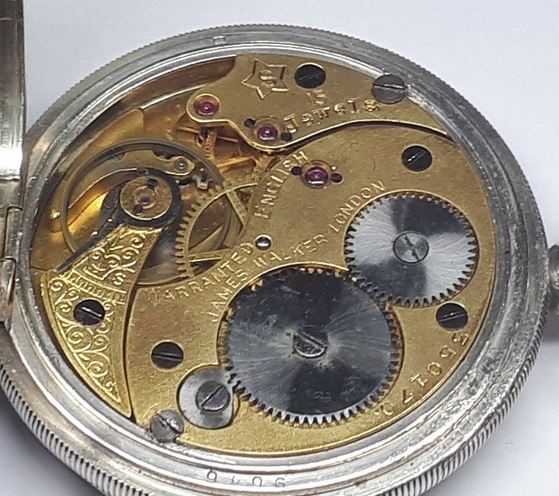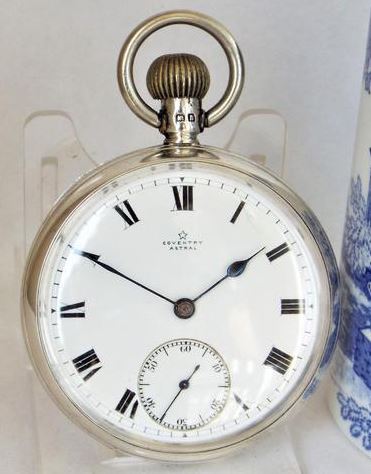H Williamson Ltd was founded in Coventry by Henry Williamson (c.1844-1914) in either 1865 or 1871. According to the census records of 1871, Henry was living in London with his wife and three children. His occupation was listed as ‘Jet ornament maker’. Jet is a hard-black fossilised wood that can be carved and highly polished. Queen Victoria wore Jet as part of her mourning dress after the death of Prince Albert in 1861. As a result, jet ornaments became extremely fashionable. When Jet eventually went out of fashion in the 1880s the company was forced to diversify into other areas.
The 1891 census shows that the Williamson family had moved to Hove, Sussex. Henry’s occupation was now listed as a wholesale jeweller. At various stages, Henry’s children, Alfred, Charles and Alice all joined the business. The company produced silver photo frames, novelty items, cigarette cases, nurses belt buckles, tableware, pill boxes, watch chains, card cases, spoons and hip flasks.
Watch factory
At some point in the 1890s, Henry started retailing watches along with silverware. In 1895, Henry purchased the Errington watch factory, which had been established in Coventry in the 1880s by Charles Hutton Errington. Errington is recorded as a watch movement maker in 1892, obtaining rough movements to finish into watches. In 1896, Henry bought the remnants of the English Watch Company, including the machinery to make both front and backplates. This meant he was in a position to manufacture and finish his own watches.
The limited company was registered in 1892, to take over the business of wholesale watch and clock manufacturers of a private company of the same name. In 1898, the firm took control of a Swiss watchmaking factory in Buren. Henry was now casing Swiss movements in English made cases. Unfortunately, just one year later, Williamson was found guilty of selling the watches as being entirely made in England. As a result, Henry was fined and had the watches confiscated. To get around this issue, Henry imported Swiss machinery into his Coventry factory. This allowed him to produce Warranted English watches with Swiss characteristics including a straight-line lever escapement.
Watch manufacturer
The 1901 census shows that the Williamson family was back living in London. Henry’s occupation was now listed as ‘Managing Director of a watch manufacturer”. By 1903 Williamson Ltd had factories in Coventry, Salisbury, Buren and La Chau-de-Fonds, Switzerland. Around 1911, suffering from declining health and deteriorating eyesight, Henry retired to Hove, Sussex. His son, Charles and another employee, William Tucker, were appointed as managing directors. Henry died in 1914.
First World War
During the First World War, H. Williamson Ltd was one of the first companies to capitalise on the new trench watch. During the company’s 1916 AGM it was noted that “…the public is buying the practical things of life. Nobody can truthfully contend that the watch is a luxury. It is said that one soldier in every four wears a wristlet watch, and the other three mean to get one as soon as they can.” During WW1, Williamson Ltd produced thousands of wristwatches a week for the War effort. By the end of the war, almost all enlisted men wore a trench watch. This trend was soon adopted by the civilian population. After all, no one was going to tell a battle-scarred veteran that their wristwatch was effeminate. They also produced cockpit watches for the Royal Flying Corps during the war.
After the war, H. Williamson Ltd ventured into the world of clock making and then further diversified into gramophones. In around 1921 the company merged with Grimshaw, Baxter and J.J. Elliott, becoming ‘The English Watch and Clock Manufacturers Ltd’. However, the two companies continued to trade and advertise under their original names. However, after a period of six years of losses and the Great Depression, the company collapsed in 1931. The company was forced into receivership and was then taken over by Smiths English Clocks in 1932. The Buren factory was taken over by a Swiss concern and the company restructured as Buren Watch Co. SA. Rotherham & Sons in Coventry took over the agency for importing Buren watches into the UK.


